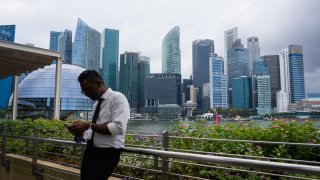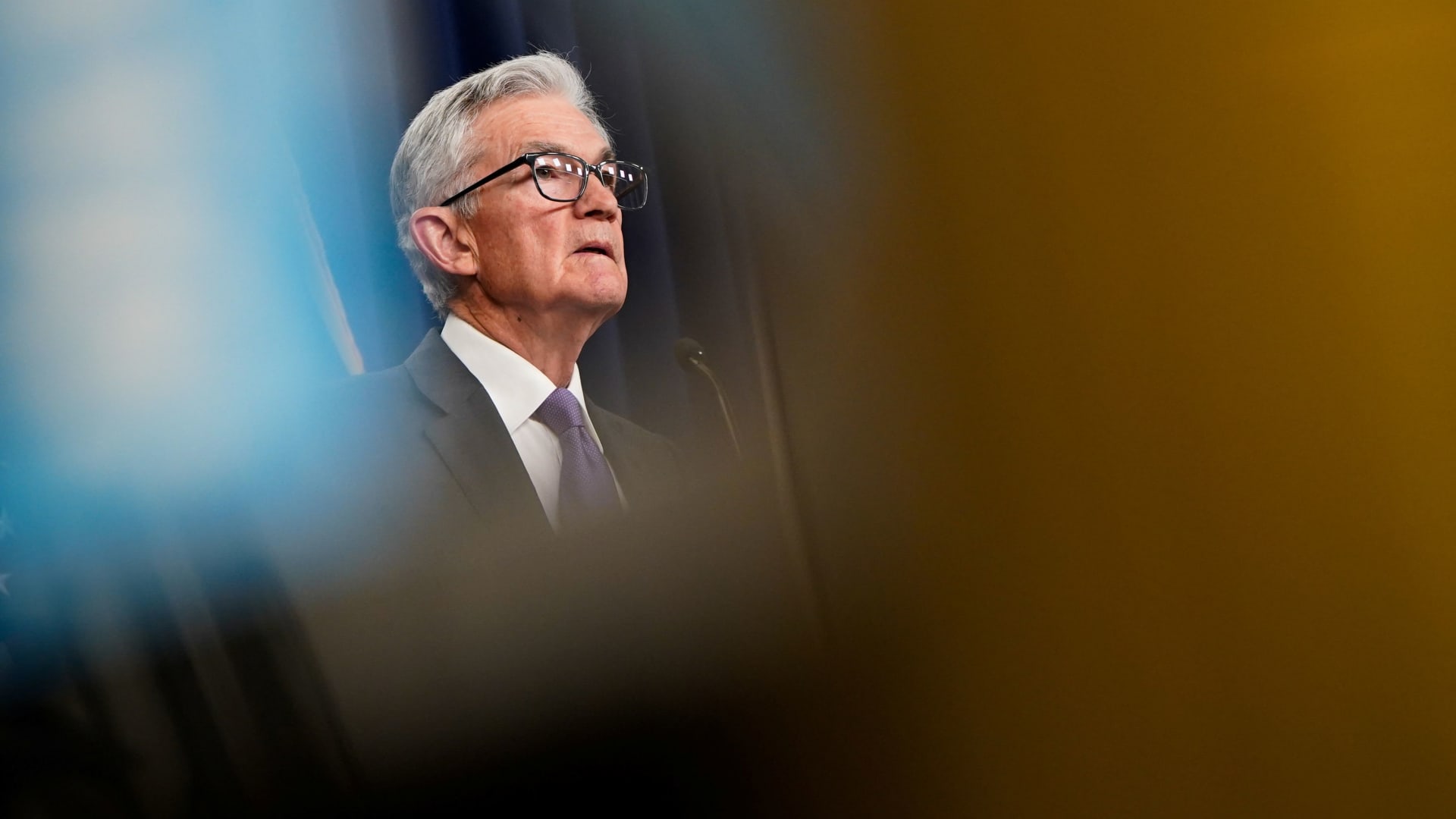
This is CNBC's live blog covering Asia-Pacific markets.
Asia-Pacific markets were mixed after Tuesday's broad sell-off, with traders watching trade data out of Japan and Singapore on Wednesday.
Singapore's non-oil domestic exports plunged 20.7% in March, marking a huge miss from the 7% decline expected by economists polled by Reuters.
Investor sentiment, however, might be tempered by comments from U.S. Federal Reserve Chair Jerome Powell, who said there has been "a lack of further progress so far this year on returning to our 2% inflation goal."
Get Southern California news, weather forecasts and entertainment stories to your inbox. Sign up for NBC LA newsletters.
Echoing recent statements by central bank officials, Powell indicated the current level of policy likely will stay in place until inflation gets closer to target.
Japan's Nikkei 225 slipped 1.32% to end at 37,961.8, below the 38,000 mark for the first time since February, while the broad-based Topix saw a smaller loss of 1.26% and closed at 2,663.15.
The Reuters Tankan index showed that business optimism dipped in Japan for April.
Money Report
Hong Kong's Hang Seng index was 0.1% lower, but the CSI 300 on mainland China bucked the trend and gained 1.55%, closing at 3,565.4.
South Korea's Kospi also extended losses, falling 0.98% to 2,584.18 after leading losses in Asia on Tuesday, but the small cap Kosdaq was marginally up and ended at 833.03.
In Australia, the S&P/ASX 200 ended marginally down, finishing at 7,605.6.
Overnight in the U.S., the Dow Jones Industrial Average rose 0.17%, to snap a six-day run of losses, lifted by UnitedHealth shares.
In contrast, the S&P 500 slipped 0.21% and the Nasdaq Composite shed 0.12%, while the 2-year U.S. Treasury yield briefly spiked above 5% following Powell's remarks.
— CNBC's Sarah Min, Alex Harring and Lisa Kailai Han contributed to this report.
Chinese stocks buck wider sell-off as securities watchdog clarifies delisting rules
Mainland Chinese stocks climbed, in contrast to the wider decline in Asian markets after the country's securities regulator clarified delisting rules.
The mainland Chinese CSI 300 climbed 1.55%, while other benchmark indexes in the region fell Wednesday.
The China Securities Regulatory Commission, in a session with journalists, explained that tighter rules would not spark a wave of delistings.
The rules announced last week pledged to tighten stock listing criteria, crack down on illegal share sales and strengthen the supervision of dividend payouts
However, the CSRC said that the delisting "indicator" was aimed at clearing out "zombies" and "bad apples" and not aimed at small cap stocks. It added that only about 30 companies would be delisted next year under the new regulations.
— Lim Hui Jie
India is an overvalued market that 'everybody likes,' says HSBC
India is a market "we like and everybody likes," but HSBC's chief Asia equity strategist Herald van der Linde said the market is currently overvalued.
"It is pricing [as] the most expensive market in the region. Even now against its own standard, its quite expensive," Linde told CNBC's "Street Signs Asia." The benchmark BSE Sensex currently has a price-to-earnings ratio of 24.91.
"So we like India, but we also acknowledge that it's not a cheap market," he highlighted.
Indian markets are closed for holiday.
Japan chipmaker Kioxia reportedly planning for lPO
Japanese chipmaker Kioxia is reportedly planning an initial public offering in 2024, according to Nikkei.
The report said the company will list on the Tokyo Stock Exchange as soon as 2024, so as to "secure funding for investment and meet high demand for memory chips driven by the proliferation of artificial intelligence."
Reuters, citing people familiar with the matter, said that Bain Capital has proposed the listing as part of a plan to allow Kioxia to refinance a $5.8 billion loan coming due in June
Kioxia was formerly known as Toshiba Memory, and was acquired by a Bain-led group in a $18 billion carve-out in 2018.
— Lim Hui Jie
Barclays expects Fed to change forecast to just one rate cut in 2024
Ajay Rajadhyaksha, Barclays' global chairman of research, expects the U.S. Federal Reserve to change its interest rate forecast and go for just one cut this year.
"The fact of the matter is that inflation data has jumped up and smacked you in the face in the last three months," he said, adding that complicates the central bank's calculation on lowering rates.
On Tuesday, Fed Chair Jerome Powell highlighted the U.S. economy has not seen inflation come back to the central bank's goal, signaling it's unlikely rates will be cut soon. In their most recent update, Fed officials in March stuck to their plan for three cuts in 2024.
Powell, clearly wants to cut rates, said Rajadhyaksha, "but after the March CPI print, I think he's going to struggle. I would be shocked if they don't change their forecast to call for one cut in 2024."
— Sumathi Bala
Fitch cuts Tencent and Alibaba ratings from 'stable' to 'negative'
Ratings agency Fitch cut its outlook on long-term default ratings for Chinese tech giants Alibaba and Tencent to "negative" from "stable."
The agency said that the move is in line with it cutting China's outlook by the same extent on April 9. Fitch also slashed the outlook on China from "stable" to "negative," but reaffirmed its rating at "A+"
Fitch wrote that this "reflects our view that the underlying credit quality of these companies should not exceed that of the sovereign due to their predominantly domestic businesses and the level of government regulation, oversight and intervention in their sector."
The long-term default ratings on the two companies' senior debt however, were affirmed at "A+."
Shares of Alibaba were down 1.31%, while Tencent shares slipped 0.53%.
— Lim Hui Jie
Japan exports climb more than expected in March
Exports from Japan rose 7.3% year on year in March, slowing from the 7.8% gain seen in February.
The figure however, was larger than the 7% increase expected by economists polled by Reuters.
Imports to the country fell 4.9% compared with the same period last year, a reversal from the 0.5% gain in February.
As such, Japan's trade surplus climbed to 366.5 billion yen ($2.37 billion), compared with the 299.9 billion yen expected in the Reuters forecast.
— Lim Hui Jie
Business optimism in Japan darkens in April: Reuters Tankan index
Business optimism in Japan darkened among large firms as the weak yen weighed on households, according to the Reuters Tankan survey for April.
The sentiment index for manufacturers stood at +9, down from the previous month's +10. A positive number means optimists outnumber pessimists, and vice versa.
The services sector index fell to +25 from +32 in the previous month, despite some gains by retailers, Reuters said.
The Reuters Tankan index, released monthly, is widely considered as a leading indicator of the Bank of Japan's quarterly tankan survey.
— Lim Hui Jie
CNBC Pro: Morgan Stanley has named its top global dividend stocks for this quarter
Investing in an increasingly volatile market — amid geopolitical risks, rising bond yields and macroeconomic uncertainty — is no mean feat.
The unpredictability has led some analysts to reiterate their recommendation to buy dividend stocks.
""The market has been pricing out Fed rate cut expectations from March onward. 'No landing' and 'sticky inflation' narratives are on the rise again. These translate into a higher UST bond yields and particularly favoring dividend stocks to outperform."," Morgan Stanley's analysts said in a recent note, naming their "high conviction" stocks for this quarter.
CNBC Pro subscribers can read more here.
— Amala Balakrishner
CNBC Pro: 'Hard to Ignore': Jefferies says this cybersecurity stock could double — even after jumping 75% in the past year
Investment bank Jefferies is forecasting a nearly 100% increase in the share price of a cybersecurity company from current levels.
The stock appears to have momentum as shares have risen by 75% over the past year and more than doubled since hitting an all-time low in early 2023.
CNBC Pro subscribers can read more here.
— Ganesh Rao
Powell says rates may need to remain elevated amid little progress on inflation

Federal Reserve Chair Jerome Powell said Tuesday that interest rates could need to stay higher for longer as the battle to bat down inflation continues.
Powell said during a panel that there had been little progress on bringing down price growth this year. Due to this, he said monetary policy could need to remain in place.
"More recent data shows solid growth and continued strength in the labor market, but also a lack of further progress so far this year on returning to our 2% inflation goal," the Fed chief said.
"The recent data have clearly not given us greater confidence, and instead indicate that it's likely to take longer than expected to achieve that confidence," he said. "That said, we think policy is well-positioned to handle the risks that we face."
— Alex Harring, Jeff Cox
Iran attack on Israel raises risk in Middle East over long term, Obama national security advisor says
Iran's weekend air assault on Israel has raised the risk in the Middle East over the long term, said Tom Donilon, national security advisor during the Obama administration.
Crude oil prices have fallen over the past two trading sessions, as fears of a wider war have eased after Israel and its U.S.-led allies successfully repelled the attack. But Donilon said the current cycle of conflict is not yet over as Israel will likely respond to the strike.
Iran is now prepared to respond directly, in many cases from its own territory, to any attack from Israel on any Iranian interest or person, said Donilon, who is also chairman of the BlackRock Investment Institute.
"Long term, it is a structural increase in the risk profile," said Donilon. The former national security advisor said he is increasingly worried about the risk of terrorist attacks in the West as the Israel-Hamas war drags on.
"The longer this goes on, I am becoming increasingly concerned about knock-on effects in terms of terrorism here in the United States, especially in Europe," Donilon said. The number of potential threats and plots that were foiled, particularly against Jewish institutions, are very high, he said.
Donilon's comments were interrupted by protestors who called for Columbia to divest from fossil fuels.
— Spencer Kimball
Fed's Jefferson sees inflation falling as policy stays on hold
Federal Reserve Governor Philip Jefferson said Tuesday that he expects inflation to continue to decline as the central bank keeps its restrictive policy in place.
"My baseline outlook continues to be that inflation will decline further, with the policy rate held steady at its current level, and that the labor market will remain strong, with labor demand and supply continuing to rebalance," Jefferson said in a discussion about how policymaking has changed over the years.
"Of course, the outlook is still quite uncertain, and if incoming data suggest that inflation is more persistent than I currently expect it to be, it will be appropriate to hold in place the current restrictive stance of policy for longer," he added.
Markets currently are pricing in the Fed to stay on hold until September, then slowly begin cutting rates.
— Jeff Cox






